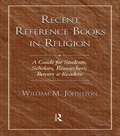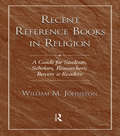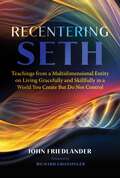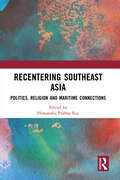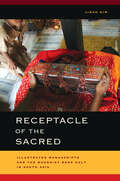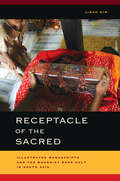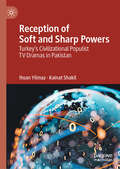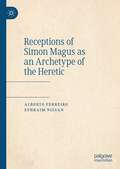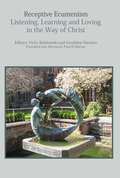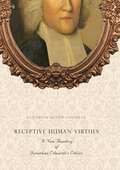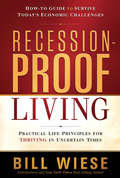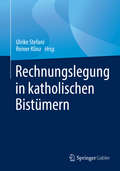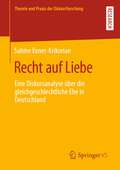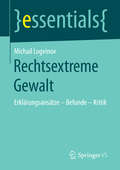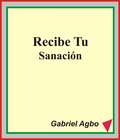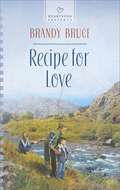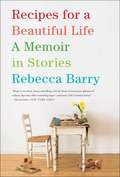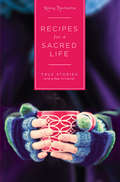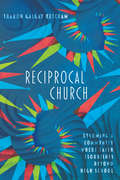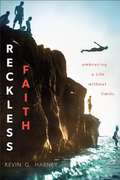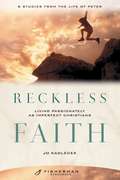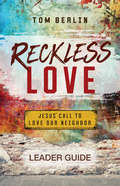- Table View
- List View
Recent Reference Books in Religion (2nd edition)
by William M. JohnstonRecent Reference Books in Religion provides incisive summaries and evaluations of more than 350 contemporary reference works on religious traditions ancient and modern that have been published in English, French and German. For maximum usefulness to readers, Professor Johnston has broadly defined religion to include not just the world religion of Christianity, Judaism, Islam, Hinduism, and Buddhism but also such alternative approaches as mythology, folklore, and the philosophy of ethics. Each entry, analyzing a particular work, includes full bibliographic details as well as commentary: outstanding articles and contributors are highlighted, strengths and weaknesses are carefully noted and weighed. Readers are directed to volumes whose strengths and weaknesses are carefully noted and weighed. Readers are directed to volumes whose strengths complement the weaknesses of others. An indispensable guide in any religious studies collection,Recent Reference Books in Religion: 2nd Edition includes works published through the end of 1997. It also includes a Glossary that describes types and functions of reference books, and five indexes: Titles, Authors, Topics, Persons and Places.
Recent Reference Books in Religion: A Guide for Students, Scholars, Researchers, Buyers, & Readers
by William M. JohnstonRecent Reference Books in Religion provides incisive summaries and evaluations of more than 350 contemporary reference works on religious traditions ancient and modern that have been published in English, French and German. For maximum usefulness to readers, Professor Johnston has broadly defined religion to include not just the world religion of Christianity , Judaism, Islam, Hinduism, and Buddhism but also such alternative approaches as mythology, folklore, and the philosophy of ethics. Each entry, analyzing a particular work, includes full bibliographic details as well as commentary: outstanding articles and contributors are highlighted, strengths and weaknesses are carefully noted and weighed. Readers are directed to volumes whose strengths and weaknesses are carefully noted and weighed. Readers are directed to volumes whose strengths complement the weaknesses of others. An indispensable guide in any religious studies collection, Recent Reference Books in Religion: 2nd Edition includes works published through the end of 1997. It also includes a Glossary that describes types and functions of refernce books, and five indexes: Titles, Authors, Topics, Persons and Places.
Recentering Seth: Teachings from a Multidimensional Entity on Living Gracefully and Skillfully in a World You Create But Do Not Control
by John Friedlander• Reframes Jane Roberts&’s Seth teachings, recentering them in the awareness that all consciousness expands in all directions • Examines how we create our reality through our conscious beliefs but how no one controls spontaneous reality so you cannot simply will your desires into being • Synthesizes Sethian teachings with an eclectic variety of concepts, schools, and influences, from aura reading and interpersonal engagement to Buddhism and Theosophy to nondual awareness, multipersonhood, and communication theory The Seth books, channeled by the late Jane Roberts in the 1970s, galvanized a whole generation of spiritual explorers. The entity known as Seth turned familiar mystical concepts into a radically new framework and introduced little known truths, including a unique understanding of how we create our own reality with our conscious beliefs. But in important ways, the Seth information hit a temporary dead end, especially through confusion about just what creating your own reality means. After nearly 5 decades exploring Seth&’s ideas, along with many other spiritual approaches, John Friedlander, a member of Jane Roberts&’s original Seth classes in 1974, has reframed the groundbreaking Seth teachings, recentering them in the awareness that all consciousness expands in all directions. He synthesizes Sethian teachings with an eclectic variety of concepts, schools, and influences, from aura reading, healing, and interpersonal engagement as taught by Lewis Bostwick, to Buddhism, reincarnation, karma, and the Theosophical practice of the seven planes, to conscious dying, nondual awareness, multipersonhood, and communication theory. Sharing engaging discussions from his classes, the author examines how you do create your own reality, but that no one controls reality, which is spontaneous and surprisingly creative. By recentering Seth in the awareness that all consciousness expands in all directions Friedlander reveals many ways to support the meaningful engagement of life as it is, bringing more pleasure not just to what is easy, but even to your tensions and contradictions.
Recentering Southeast Asia: Politics, Religion and Maritime Connections
by Himanshu Prabha RayThis book assesses the impact of European colonization in the late 19th and early 20th century in ‘restructuring’ the shared past of India and Southeast Asia. It provides case studies that transcend colonial constructs and adopt newer approaches to understanding the shared past. The authors explore these developments through the lens of political figures like Jawaharlal Nehru (1889–1964) and re-examine themes such as the Greater India Society (1926–1959) established in Calcutta, and the role of Buddhism in post-World War II connections, as the repatriation of the mortal remains of Japanese soldiers killed in Burma (Myanmar) acquired urgency.Drawing on a diverse range of sources including archaeology, Buddhist texts, the afterlives of the Hindu temples, maritime networks, and inscriptions from Vietnam and central India, the book will be an essential read for scholars and researchers of history, Buddhism, archaeology, heritage studies, cultural studies, and political history as well as South and Southeast Asian history.
Receptacle of the Sacred: Illustrated Manuscripts and the Buddhist Book Cult in South Asia (South Asia Across the Disciplines)
by Jinah KimIn considering medieval illustrated Buddhist manuscripts as sacred objects of cultic innovation, Receptacle of the Sacred explores how and why the South Asian Buddhist book-cult has survived for almost two millennia to the present. A book "manuscript" should be understood as a form of sacred space: a temple in microcosm, not only imbued with divine presence but also layered with the memories of many generations of users. Jinah Kim argues that illustrating a manuscript with Buddhist imagery not only empowered it as a three-dimensional sacred object, but also made it a suitable tool for the spiritual transformation of medieval Indian practitioners. Through a detailed historical analysis of Sanskrit colophons on patronage, production, and use of illustrated manuscripts, she suggests that while Buddhism’s disappearance in eastern India was a slow and gradual process, the Buddhist book-cult played an important role in sustaining its identity. In addition, by examining the physical traces left by later Nepalese users and the contemporary ritual use of the book in Nepal, Kim shows how human agency was critical in perpetuating and intensifying the potency of a manuscript as a sacred object throughout time.
Receptacle of the Sacred: Illustrated Manuscripts and the Buddhist Book-cult in South Asia
by Jinah KimIn considering medieval illustrated Buddhist manuscripts as sacred objects of cultic innovation, Receptacle of the Sacred explores how and why the South Asian Buddhist book-cult has survived for almost two millennia to the present. A book "manuscript" should be understood as a form of sacred space: a temple in microcosm, not only imbued with divine presence but also layered with the memories of many generations of users. Jinah Kim argues that illustrating a manuscript with Buddhist imagery not only empowered it as a three-dimensional sacred object, but also made it a suitable tool for the spiritual transformation of medieval Indian practitioners. Through a detailed historical analysis of Sanskrit colophons on patronage, production, and use of illustrated manuscripts, she suggests that while Buddhism's disappearance in eastern India was a slow and gradual process, the Buddhist book-cult played an important role in sustaining its identity. In addition, by examining the physical traces left by later Nepalese users and the contemporary ritual use of the book in Nepal, Kim shows how human agency was critical in perpetuating and intensifying the potency of a manuscript as a sacred object throughout time.
Reception of Soft and Sharp Powers: Turkey’s Civilizational Populist TV Dramas in Pakistan
by Ihsan Yilmaz Kainat ShakilThis book examines the projection of soft and sharp powers through the Turkish civilizational populist TV series "Resurrection: Ertugrul" and its reception in Pakistan. By analyzing the content of the series, elite responses, interviews with ordinary Pakistanis, and Pakistani cyberspace, the book argues that beyond soft power, the show exerts Turkey’s sharp power transnationally, through themes of authoritarianism, violence, warfare, desire for killing and dying, Islamist collective victimhood, conspiracy theories and anti-Christian sentiments. The book contributes to the literatures on sharp power, populism, and authoritarianism.
Receptions of Simon Magus as an Archetype of the Heretic
by Ephraim Nissan Alberto FerreiroThis book about receptions of Simon Magus uncovers further facets of one who was held to be the evil archetype of heretics. Ephraim Nissan and Alberto Ferreiro explore how Simon Magus has been represented in text, visual art, and music. Special attention is devoted to the late medieval Catalan painter Lluís Borrassà and the Italian librettist and musician Arrigo Boito. The tradition of Simon Magus’ demonic flight, ending in his crashing down, first appears in the patristic literature. The book situates that flight typologically across cultures. Fascinating observations emerge, as the discussion spans flight of the wicked in rabbinic texts, flight and death of King Lear’s father and a Soviet-era Buryat Buddhist monk, flight and doom of the fool in an early modern German broadsheet, and more. The book explains and moves beyond extant scholarly wisdom on how the polemic against Mani (the founder of Manichaeism) was tinged with hues of Simon Magus. The novelty of this book is that it shows that Simon Magus’ receptions teach us a great deal about the contexts in which this archetype was deployed.
Receptive Ecumenism: Listening, Learning and Loving in the Way of Christ
by Vicky Balabanski Geraldine HawkesThis book is a response to the growing recognition of Receptive Ecumenism as a concept and process that has the potential to bring about the greater flourishing of the Church, both within denominations and across the Church universal.
Receptive Human Virtues: A New Reading of Jonathan Edwards's Ethics
by Elizabeth Agnew CochranThis book offers a new reading of Jonathan Edwards’s virtue ethic that examines a range of qualities Edwards identifies as “virtues” and considers their importance for contemporary ethics. Each of Edwards’s human virtues is “receptive” in nature: humans acquire the virtues through receiving divine grace, and therefore depend utterly on Edwards’s God for virtue’s acquisition. By contending that humans remain authentic moral agents even as they are unable to attain virtue apart from his God’s assistance, Edwards challenges contemporary conceptions of moral responsibility, which tend to emphasize human autonomy as a central part of accountability.
Recession-Proof Living: Practical Life Principles for Thriving in Uncertain Times
by Bill WieseMake the impossible possible by following God’s principles for life Bill Wiese had a successful real estate career spanning over thirty-five years through both good and tough economic times. Early in his career, he made the decision to carefully study the Bible and apply God’s methods to every move that he made. As a result, he attained success that was unheard of for many other agents, simply because he adhered to God’s plan. In Recession-Proof Living, he shares these biblical principles along with true stories of his experiences to demonstrate how anyone can achieve success--spiritually, financially, physically, and corporately by living according to God’s economic system. Not simply a book about how to make money, Recession-Proof Living shows you how to live a life that guarantees success God’s way. Even if every effort and method you’ve tried has failed, living by God’s standard won’t.
Rechnungslegung in katholischen Bistümern
by Ulrike Stefani Reiner KlinzDieses Buch vermittelt relevante Aspekte der Rechnungslegung in katholischen Bistümern. Deren wichtigste Einnahmequelle sind neben Staatsleistungen und Zuschüssen die Kirchensteuern. Zusätzlich zu ihrer Kernaufgabe, der Verkündigung des Evangeliums, leisten die Kirchen wichtige Beiträge für die Gemeinschaft. Doch der demographische Wandel und Kirchenaustritte wirken sich langfristig negativ auf die finanzielle Lage aus. Als wichtige Gegenmaßnahme gilt die Schaffung von mehr Transparenz: Wie die katholische Kirche ihr Rechnungswesen von der Kameralistik auf die Doppik umstellt, Jahresabschlüsse erstellt und veröffentlicht, zeigen die Beiträge in diesem Buch. Im Vordergrund stehen Ansatz und Bewertung, aber auch Umstellungsfragen und die Modernisierung der Governance-Strukturen. Die dargestellten Aspekte zur Rechnungslegung sind zumindest teilweise anwendbar für andere katholische Rechtsträger wie Bischöfliche Stühle, Domkapitel, Orden, Stiftungen und Kirchengemeinden sowie für Rechtsträger der evangelischen Kirche.
Recht auf Liebe: Eine Diskursanalyse über die gleichgeschlechtliche Ehe in Deutschland (Theorie und Praxis der Diskursforschung)
by Sabine Exner-KrikorianSabine Exner-Krikorian untersucht in dieser Studie den Diskurs über die gleichgeschlechtliche Ehe in Deutschland von 1998 bis 2017. Sie geht der Frage nach, wie zeitgenössische religiöse, politische und gesellschaftliche Akteur*innen um die Deutungshoheit von Ehe wetteifern. Im Detail wird gezeigt, dass die Diskursakteur*innen in diesem Aushandlungsprozess die Prämisse einer angenommenen Moderne, die Dichotomie religiös/säkular sowie Narrative von und über Religion(en) als diskursive Strategien einsetzen. Eingebettet ist die Analyse in eine historische Rekonstruktion der Ehe seit der Reformation als Deutungs- und Machtkampf politischer und religiöser Akteur*innen. Mit einem zeit-, akteurs- und arenaspezifischen Ansatz verknüpft die Autorin methodologisch die Wissenssoziologische Diskursanalyse (WDA) nach Reiner Keller mit einem religionswissenschaftlichen Erkenntnisinteresse.
Rechtsextreme Gewalt: Erklärungsansätze – Befunde – Kritik (essentials)
by Michail LogvinovVor dem Hintergrund steigender rechtsextremer Gewalt widmet sich dieses essential der Frage, welche Erkl#65533;rungsans#65533;tze die Rechtsextremismusforschung f#65533;r die rechte Gewaltkriminalit#65533;t erarbeitet hat. Michail Logvinov diskutiert die in den soziologischen Forschungen verbreiteten Interpretationen der Radikalisierungsprozesse im rechten Milieu und arbeitet ihre St#65533;rken und Schw#65533;chen heraus. Er bietet Definitionen der relevanten Gewaltbegriffe und Informationen zur Rolle des Kampfes als Denkfigur und Deutungsmuster im Rechtsextremismus.
Recibe Tu Sanación
by Gabriel AgboEste libro es acerca de cómo recibir sanación divina. ¿Puede Dios curar todavía? ¡Sí! Nuestro Dios es el mismo ayer, hoy y siempre. Espera tu sanación mientras lees este libro. Aquí, leerás algunos testimonios increíbles que instantáneamente aumentarán tu fe en Dios y en Su ilimitada capacidad y deseo de intervenir hasta en las peores situaciones. Por ejemplo, Dios todavía cura enfermedades incurables y terminales. Él todavía resucita a los muertos. ¿Has leído acerca de un hombre que fue resucitado de la muerte luego de permanecer dos días en la morgue? Ahora bien, si Dios puede hacer eso, ¿por qué piensas que no se puede hacer nada con respecto a tu situación? Hay muchos otros testimonios increíbles aquí. Hay diez capítulos poderosos y luminosos en este libro: Todo es Posible, La Sanación es tu Derecho, el Origen de las Enfermedades, La Palabra de Dios, El Nombre de Jesús, El Espíritu Santo, El Poder de la Fe, Còmo conservar tu Sanación. También aprenderás sobre los roles de la oración, la unción con aceite, la imposición de manos, la compasión (amor), la obediencia, los ángeles, la alabanza y la adoración, etc, en nuestro afán de que recibas y conserves tu sanación. Este libro está diseñado para que recibas tu sanación mientras lo vas leyendo, y es muy práctico.
Recipe for Disaster
by Aimee LucidoIn this heartfelt middle school drama, Hannah's schemes for throwing her own bat mitzvah unleash family secrets, create rivalries with best friends, and ultimately teach Hannah what being Jewish is all about. <p><p> With a delicious mix of prose, poetry, and recipes, this hybrid novel is another fresh, thoughtful, and accessible Versify novel that is cookin’. - New York Times Best-Selling Author Kwame Alexander <p><p> Hannah Malfa-Adler is Jew . . . ish. Not that she really thinks about it. She'd prefer to focus on her favorite pastime: baking delicious food! But when her best friend has a beyond-awesome Bat Mitzvah, Hannah starts to feel a little envious ...and a little left out. <p><p> Despite her parents firm no, Hannah knows that if she can learn enough about her own faith, she can convince her friends that the party is still in motion. As the secrets mount, a few are bound to explode. When they do, Hannah learns that being Jewish isn't about having a big party and a fancy dress and a first kiss — it's about actually being Jewish. Most importantly, Hannah realizes that the only person's permission she needs to be Jewish, is her own.
Recipe for Love
by Brandy BruceIs Jeremy Mitchell Cooking Up Romance? Overworked chef Jeremy has ordered up the perfect vacation: a fly-fishing getaway and some much-needed alone time. But when he arrives in the Colorado mountain town, he's immediately captivated by the lovely proprietor of the bed-and-breakfast, not to mention her young son. Alison Taylor still mourns her first husband even as she fights to keep their shared dream of a B and B alive. But there's no denying that she and her big-city guest have all the right ingredients for something special. Will this star-crossed pair realize that second chances can happen...if only they'll let them?
Recipes and Wooden Spoons (Tales from Grace Chapel Inn #3)
by Judy BaerOnce you visit the charming village of Acorn Hill, you'll never want to leave. Here, the three Howard sisters rekindle old memories, rediscover the bonds of sisterhood, revel in the blessings of friendship, and meet many fascinating guests along the way. While cleaning out the cluttered basement of Grace Chapel Inn, Jane Howard finds an old cookbook brimming with her mother's recipes and hand written notes. Through these precious, fragile pages of the recipe book, Jane comes to discover the spirit of her mother, Madeleine, who died while giving birth to Jane. But when the inn gets busy and money troubles threaten, Jane wonders if moving back to Acorn Hill was a big mistake. Can her crisis of faith lead to a new solution for the inn -- and for Jane herself?
Recipes for a Beautiful Life: A Memoir in Stories
by Rebecca BarryWriting with "a delicate, beautiful balance of wit and yearning" (#1 New York Times bestselling author Elizabeth Gilbert), Rebecca Barry's poignant take on creativity, marriage, and motherhood will make you laugh and cry--sometimes at the same time.When Rebecca Barry, writer, mother, cat lady, and aspiring meditator, and her husband moved to upstate New York to start their family, they were optimistic that they'd be able to build a life they'd love: one connected to nature and extended family, one where they could invest in their artistic dreams, spend time with their children, live cheaply, and eat well. Naturally, things didn't turn out to be so simple: the lovely old house they bought to fix up needed lots of repair, their children wouldn't sleep, and the novel Rebecca had dreamed of writing simply wouldn't come to her. "Anecdotal, funny, and telling, with the kinds of momentary glimpses of ordinary days that reflect something larger" (The New York Times), Recipes for a Beautiful Life is about reveling in the extraordinary moments in daily life while trying to balance marriage, children, extended family, and creative work. The book is an excellent companion for mothers with small children, but it also speaks to anyone trying to find meaning in their work or a life that is truer to the heart. Full of great dialogue, tongue-in-cheek recipes (Angry Mommy Tea), and tips on things like how to keep your house clean ("just don't let anyone in"), Recipes captures the sweetness and beauty of answering your soul's longing, as well as the difficulty, struggle, and humor that goes along with it. Mostly it is about the realization that a beautiful life, for this author, meant a rich, often chaotic, creative one. Or, as Redbook said when it featured the book in its "5 fabulous, even life-changing new reads" column: "Contentment isn't about getting everything...but finding magic in the mess."
Recipes for a Sacred Life
by Rivvy NeshamaWhen Rivvy Neshama was twenty-two and about to get married, her mother gave her a book of handwritten recipes that taught her how to make a good roast — but not much else. And no one gave her the recipe to make a good marriage or a good life. That took years of searching on a path with many turns. Now, like a handwritten recipe book, Recipes for a Sacred Life is passing on the most meaningful and inspiring stories from the author’s life. From birth to death and in between; from dancing to forgiveness to sacred sex; and from a rabbi from Vienna to Irish Rita from the Bronx, they feature people and experiences that taught the author how to live a good life — one touched with sacredness. And, as it turned out, the best recipes came from her mom. Written with heart and humor and steeped in ancient wisdom, these short, true tales reveal how ordinary encounters — with friends, nature, lovers, and strangers — can suddenly connect us with the sacred, adding love, joy, and purpose to our lives. In the spirit of Anne Lamott, Mitch Albom, and Rachel Naomi Remen, Recipes for a Sacred Life is luminous and uplifting — a gift for all.
Reciprocal Church: Becoming a Community Where Faith Flourishes Beyond High School
by Sharon Galgay KetchamThe church faces an unprecedented loss of rising generations. Young adults who were active and engaged in the local church are leaving the community behind after high school. What can we do? Sharon Galgay Ketcham reflects theologically on the church community and its role in forming faith, offering values and practices that can shape a community into a place where faith will flourish in those both young and old.
Reckless Ecstasy
by Wanda OwenDECEITFUL GAMBLER The instant flaming-haired Kristina saw dashing Danton Navarro at her mother's high class gaming house, she knew he was the one she'd marry. His virile physique would protect her from all harm; his strong hands would teach her all the secrets of passion. Then the hot tempered girl watched the stranger embrace a voluptuous painted woman and Kristina was filled with an inexplicable rage. She swore that somehow she'd make Danton say "I do." But first she'd flirt with every handsome cardshark and make the man she loved suffer as painfully for her as she did for him. Towering Danton Navarro knew enough willing ladies in El Paso who would freely pleasure him all night long, but some despeerately needed information led him to the Crystal Castle. There he found the most fetching, provocative miss he had ever desired and was furious that she bartered the exquisite body only he had the right to possess. He never stopped to think she might not be what she seemed. All that governed him now was the overwhelming need to crush the pouting lips, brand the silken thighs, and force her supple body to totally submit to his driving Reckless Ecstasy.
Reckless Faith: Embracing A Life Without Limits
by Kevin G. HarneyIn a world where we tend to be over-cautious about, well, nearly everything, it's no surprise that our obsession with safety can carry over to how we live our faith in the world. But it's always been risky to follow God, and Kevin Harney believes we are missing a vital part of our faith when we play it safe. In this energizing book, he challenges readers to count the cost, take a chance, and live a reckless faith for the entire world to see. With a focus on "responsible recklessness," Harney shows readers how to develop a faith that others notice, always supported by prayer, wisdom, the direction of Scripture, and insightful counsel from other believers. He outlines how to be reckless in our love, generosity, service, relationships, prayers, and speech. Perfect for pastors, small groups, or anyone who is tired of feeling domesticated and docile, this book will lead readers into a fresh devotion and dynamism in their faith.
Reckless Faith: Living Passionately as Imperfect Christians (Fisherman Resources Series)
by Jo KadlecekHoly Human He was impulsive, arrogant, and passionate to a fault. Yet Jesus chose him to lead the early church. Peter, one of the most colorful of Jesus' disciples, paints the picture of a man who wants desperately to be holy but is hampered by being all too human. Sound familiar? Reckless Faith looks at this caustic, cocky, cowardly, chosen man and what his life has to say to Christians today. Through a study of his letters, the book of Acts, and the Gospels, Peter springs off the page as one who held nothing back, lived large, and was used by God despite his most sinful nature. This Fisherman Resource includes author commentary, interactive questions, and opportunities for reflection as you discover how God allows us to come to him as holy and human. Great for individual study or in a group, Reckless Faith will show you that being a follower of God doesn't necessarily mean having it all together.
Reckless Love Leader Guide: Jesus' Call to Love Our Neighbor (Reckless Love)
by Tom BerlinHow did Jesus teach the Greatest Commandment to his disciples?In his latest book Reckless Love, author and Pastor Tom Berlin writes that Jesus taught them to love neighbor first as a way to more deeply love God.In his exploration of Jesus’ teaching and travels with his disciples, Berlin suggests that Jesus teaches us how to love God with heart, soul, mind, and strength by showing us how to love our neighbor. While many hope to learn to be better family, friends, leaders, neighbors but finding a deeper relationship with God, what if becoming a better neighbor leads you to that deeper love of God.In Reckless Love, you will see the ways Jesus’ care for others disrupted the way his disciples thought and acted so deeply that they learned love God fully and join Jesus mission to share the good news unambiguously. In so doing, you will have the opportunity to consider your life, and learn how loving the people around you will completely renew your faith and give you a new experience of loving God.The Leader Guide contains everything needed to guide a group through the six-week study including session plans, activities, and discussion questions, as well as multiple format options.
